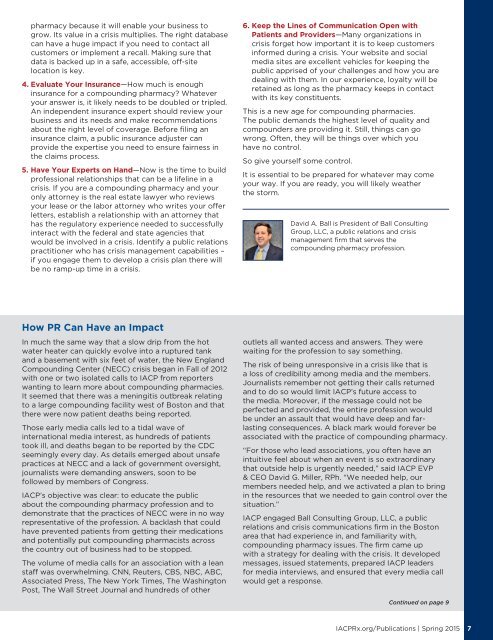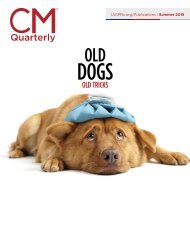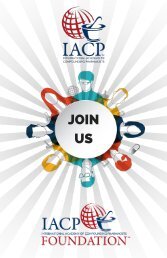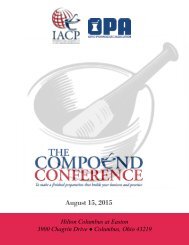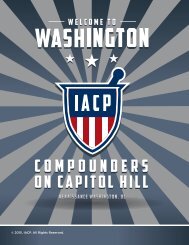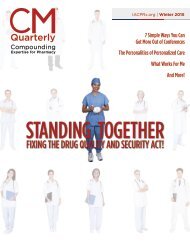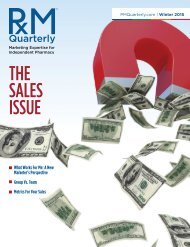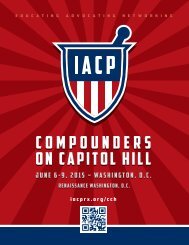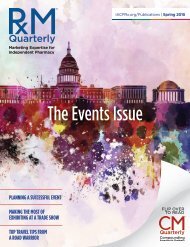Compounding Matters Quarterly - Spring 2015
Welcome to the spring issue of Compounding Matters Quarterly. In this issue: A Note From the President Six Things I Have Learned From Compounding Pharmacy Crises The Memorandum of Understanding: What It Is, What It Says, And What Happens Next The MOU -A Pharmacist's Perspective Personality of Personalized Care: Loren Madden Kirk IACP Foundation History Part 1 Save the Date For These Upcoming Programs
Welcome to the spring issue of Compounding Matters Quarterly.
In this issue:
A Note From the President
Six Things I Have Learned From Compounding Pharmacy Crises
The Memorandum of Understanding: What It Is, What It Says, And What Happens Next
The MOU -A Pharmacist's Perspective
Personality of Personalized Care: Loren Madden Kirk
IACP Foundation History Part 1
Save the Date For These Upcoming Programs
You also want an ePaper? Increase the reach of your titles
YUMPU automatically turns print PDFs into web optimized ePapers that Google loves.
pharmacy because it will enable your business to<br />
grow. Its value in a crisis multiplies. The right database<br />
can have a huge impact if you need to contact all<br />
customers or implement a recall. Making sure that<br />
data is backed up in a safe, accessible, off-site<br />
location is key.<br />
4. Evaluate Your Insurance—How much is enough<br />
insurance for a compounding pharmacy? Whatever<br />
your answer is, it likely needs to be doubled or tripled.<br />
An independent insurance expert should review your<br />
business and its needs and make recommendations<br />
about the right level of coverage. Before filing an<br />
insurance claim, a public insurance adjuster can<br />
provide the expertise you need to ensure fairness in<br />
the claims process.<br />
5. Have Your Experts on Hand—Now is the time to build<br />
professional relationships that can be a lifeline in a<br />
crisis. If you are a compounding pharmacy and your<br />
only attorney is the real estate lawyer who reviews<br />
your lease or the labor attorney who writes your offer<br />
letters, establish a relationship with an attorney that<br />
has the regulatory experience needed to successfully<br />
interact with the federal and state agencies that<br />
would be involved in a crisis. Identify a public relations<br />
practitioner who has crisis management capabilities –<br />
if you engage them to develop a crisis plan there will<br />
be no ramp-up time in a crisis.<br />
6. Keep the Lines of Communication Open with<br />
Patients and Providers—Many organizations in<br />
crisis forget how important it is to keep customers<br />
informed during a crisis. Your website and social<br />
media sites are excellent vehicles for keeping the<br />
public apprised of your challenges and how you are<br />
dealing with them. In our experience, loyalty will be<br />
retained as long as the pharmacy keeps in contact<br />
with its key constituents.<br />
This is a new age for compounding pharmacies.<br />
The public demands the highest level of quality and<br />
compounders are providing it. Still, things can go<br />
wrong. Often, they will be things over which you<br />
have no control.<br />
So give yourself some control.<br />
It is essential to be prepared for whatever may come<br />
your way. If you are ready, you will likely weather<br />
the storm.<br />
David A. Ball is President of Ball Consulting<br />
Group, LLC, a public relations and crisis<br />
management firm that serves the<br />
compounding pharmacy profession.<br />
How PR Can Have an Impact<br />
In much the same way that a slow drip from the hot<br />
water heater can quickly evolve into a ruptured tank<br />
and a basement with six feet of water, the New England<br />
<strong>Compounding</strong> Center (NECC) crisis began in Fall of 2012<br />
with one or two isolated calls to IACP from reporters<br />
wanting to learn more about compounding pharmacies.<br />
It seemed that there was a meningitis outbreak relating<br />
to a large compounding facility west of Boston and that<br />
there were now patient deaths being reported.<br />
Those early media calls led to a tidal wave of<br />
international media interest, as hundreds of patients<br />
took ill, and deaths began to be reported by the CDC<br />
seemingly every day. As details emerged about unsafe<br />
practices at NECC and a lack of government oversight,<br />
journalists were demanding answers, soon to be<br />
followed by members of Congress.<br />
IACP’s objective was clear: to educate the public<br />
about the compounding pharmacy profession and to<br />
demonstrate that the practices of NECC were in no way<br />
representative of the profession. A backlash that could<br />
have prevented patients from getting their medications<br />
and potentially put compounding pharmacists across<br />
the country out of business had to be stopped.<br />
The volume of media calls for an association with a lean<br />
staff was overwhelming. CNN, Reuters, CBS, NBC, ABC,<br />
Associated Press, The New York Times, The Washington<br />
Post, The Wall Street Journal and hundreds of other<br />
outlets all wanted access and answers. They were<br />
waiting for the profession to say something.<br />
The risk of being unresponsive in a crisis like that is<br />
a loss of credibility among media and the members.<br />
Journalists remember not getting their calls returned<br />
and to do so would limit IACP’s future access to<br />
the media. Moreover, if the message could not be<br />
perfected and provided, the entire profession would<br />
be under an assault that would have deep and farlasting<br />
consequences. A black mark would forever be<br />
associated with the practice of compounding pharmacy.<br />
“For those who lead associations, you often have an<br />
intuitive feel about when an event is so extraordinary<br />
that outside help is urgently needed,” said IACP EVP<br />
& CEO David G. Miller, RPh. “We needed help, our<br />
members needed help, and we activated a plan to bring<br />
in the resources that we needed to gain control over the<br />
situation.”<br />
IACP engaged Ball Consulting Group, LLC, a public<br />
relations and crisis communications firm in the Boston<br />
area that had experience in, and familiarity with,<br />
compounding pharmacy issues. The firm came up<br />
with a strategy for dealing with the crisis. It developed<br />
messages, issued statements, prepared IACP leaders<br />
for media interviews, and ensured that every media call<br />
would get a response.<br />
Continued on page 9<br />
IACPRx.org/Publications | <strong>Spring</strong> <strong>2015</strong><br />
7


